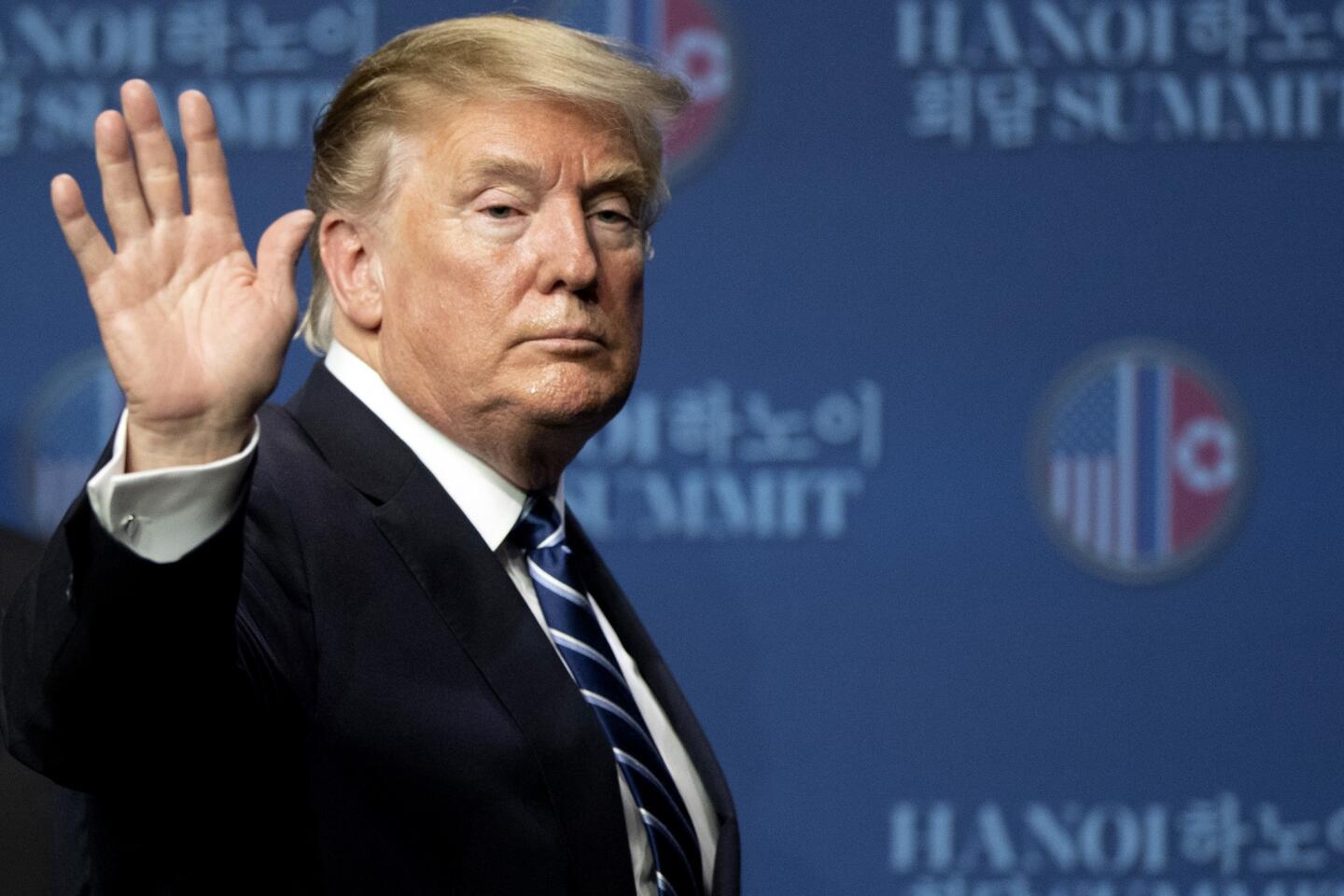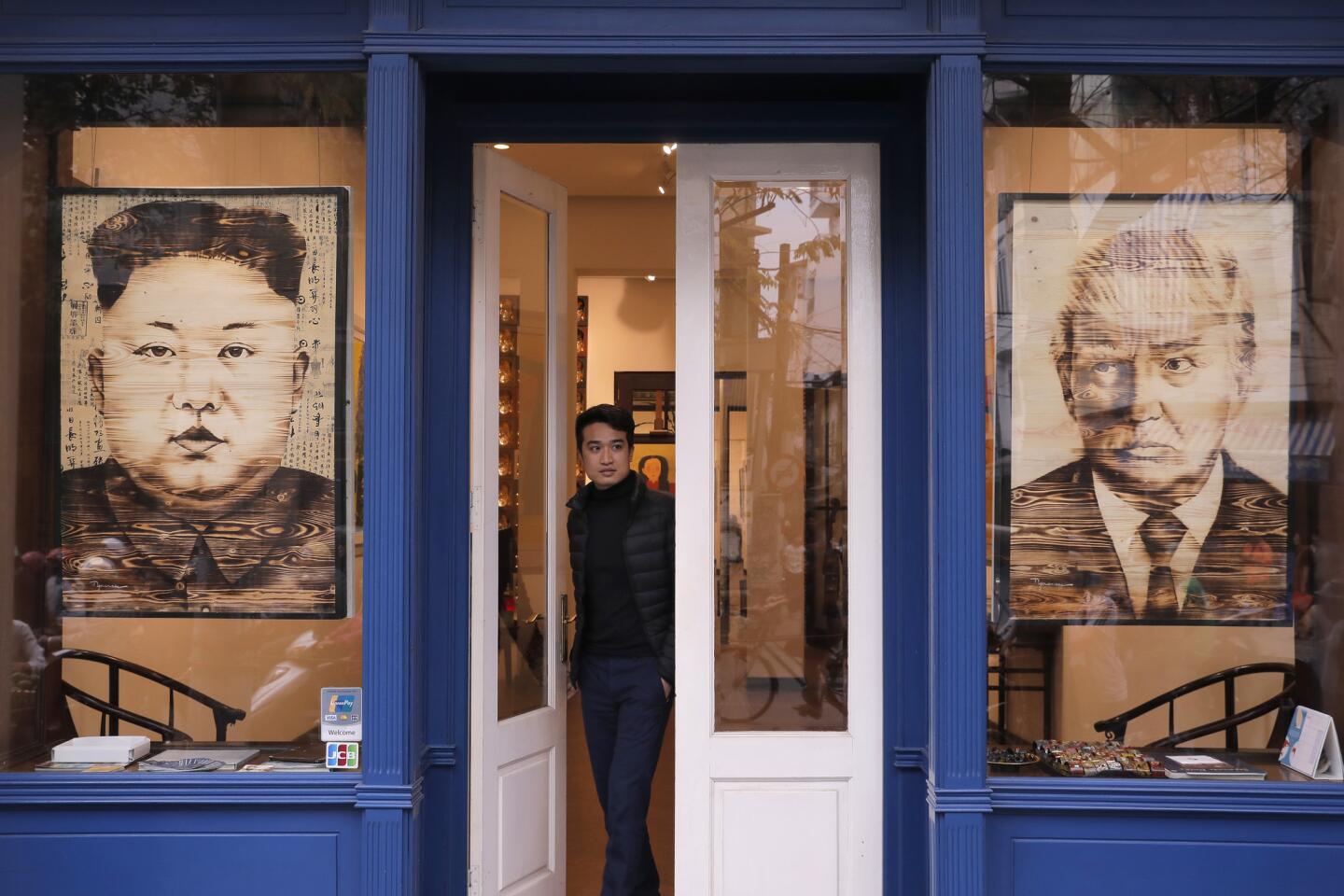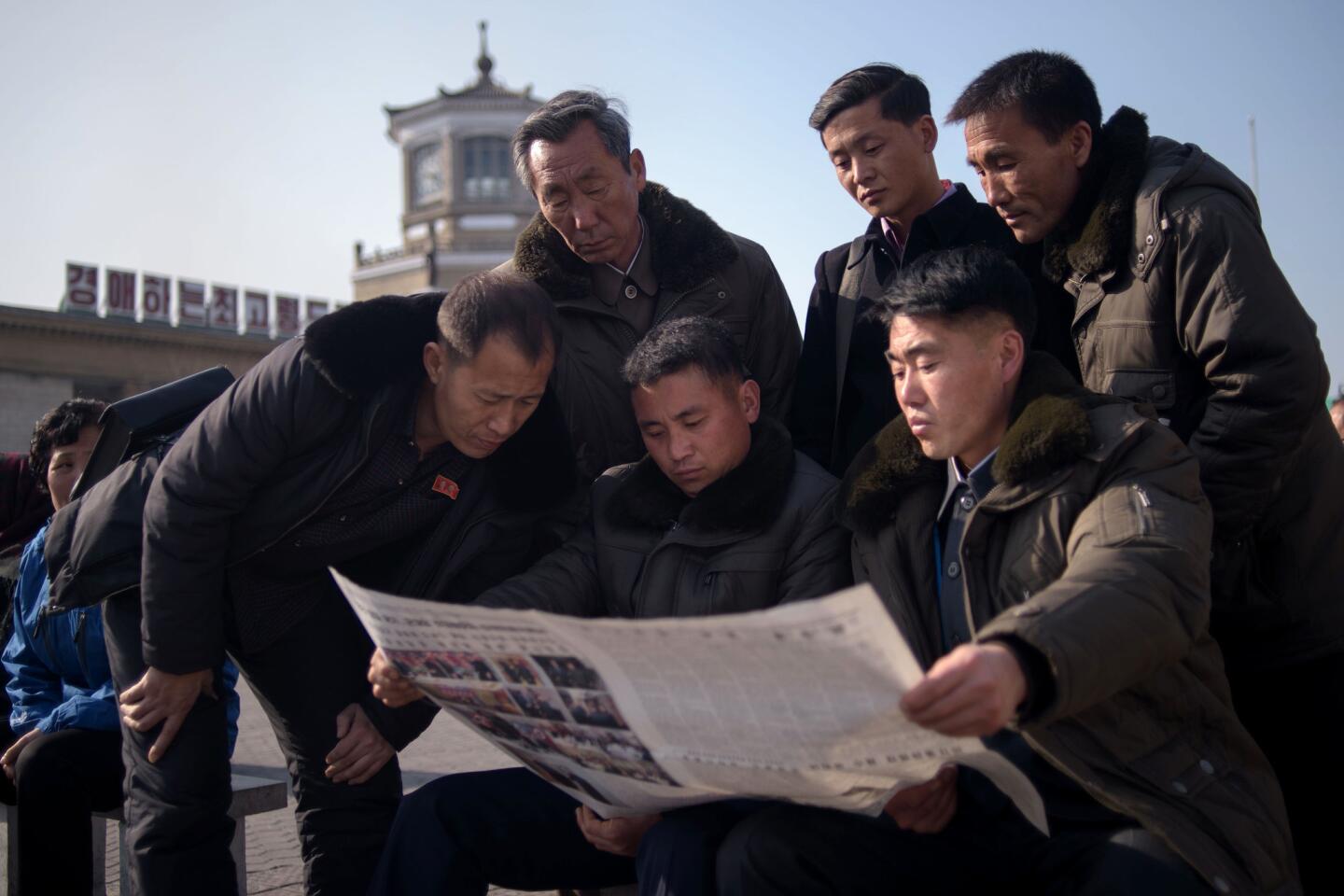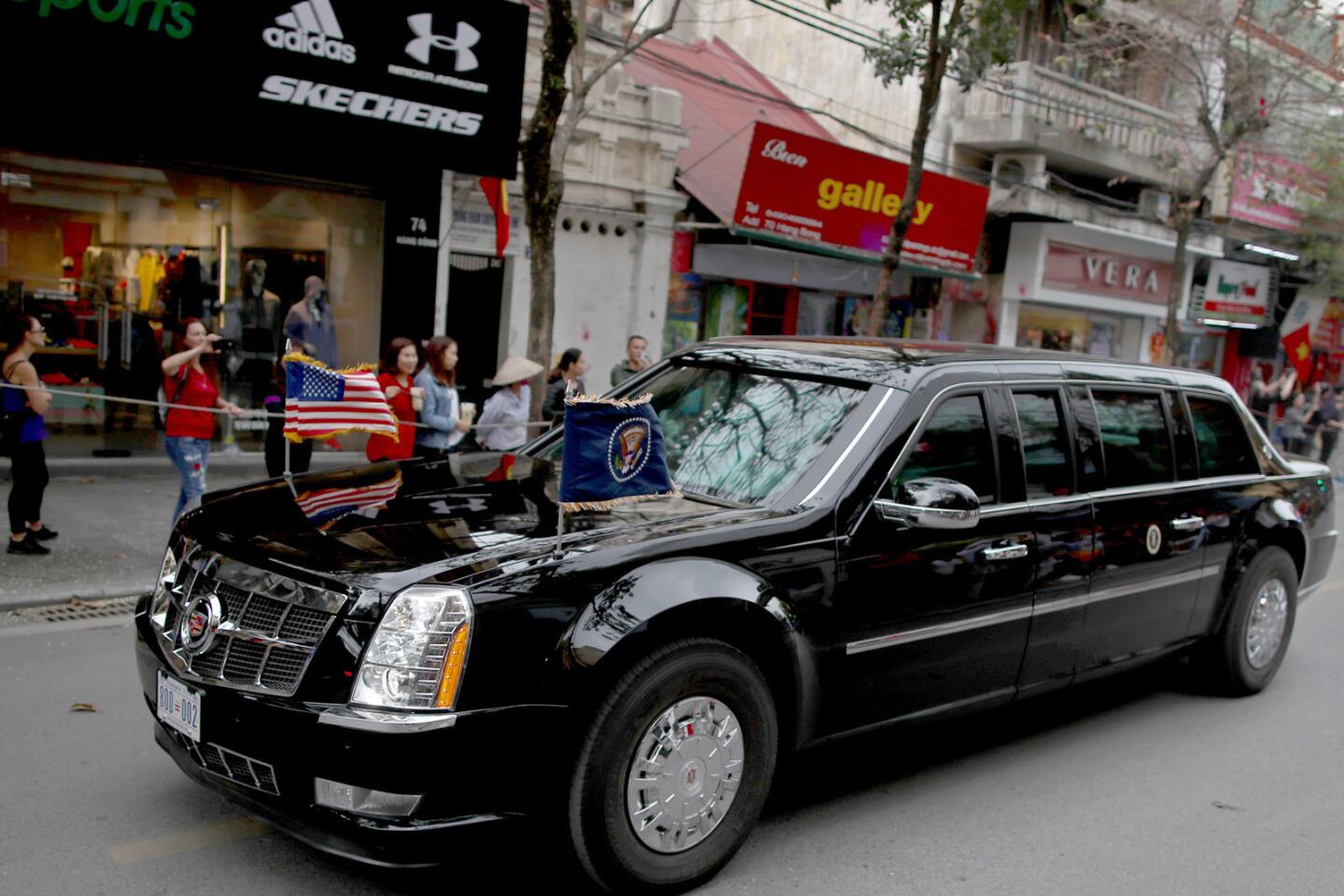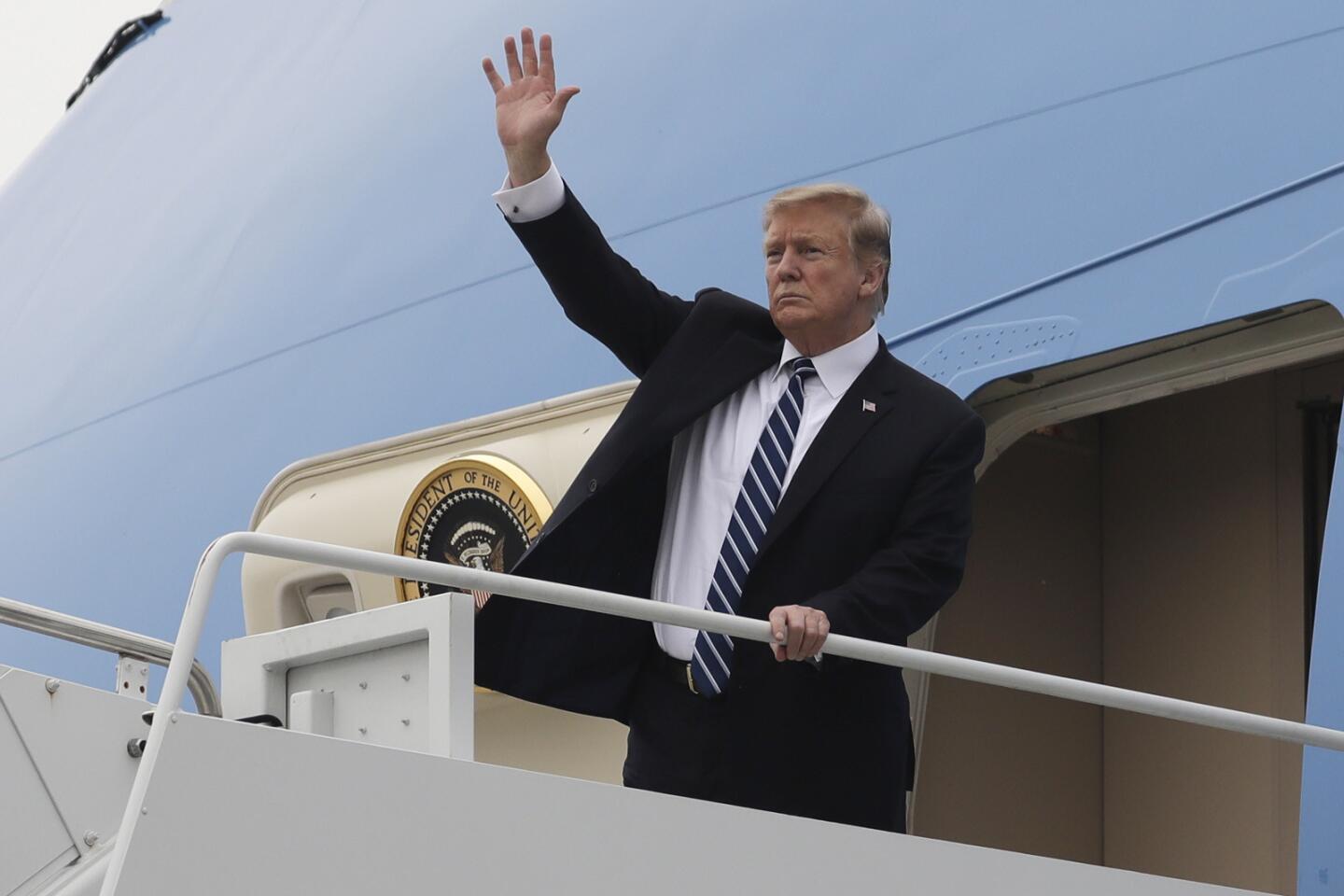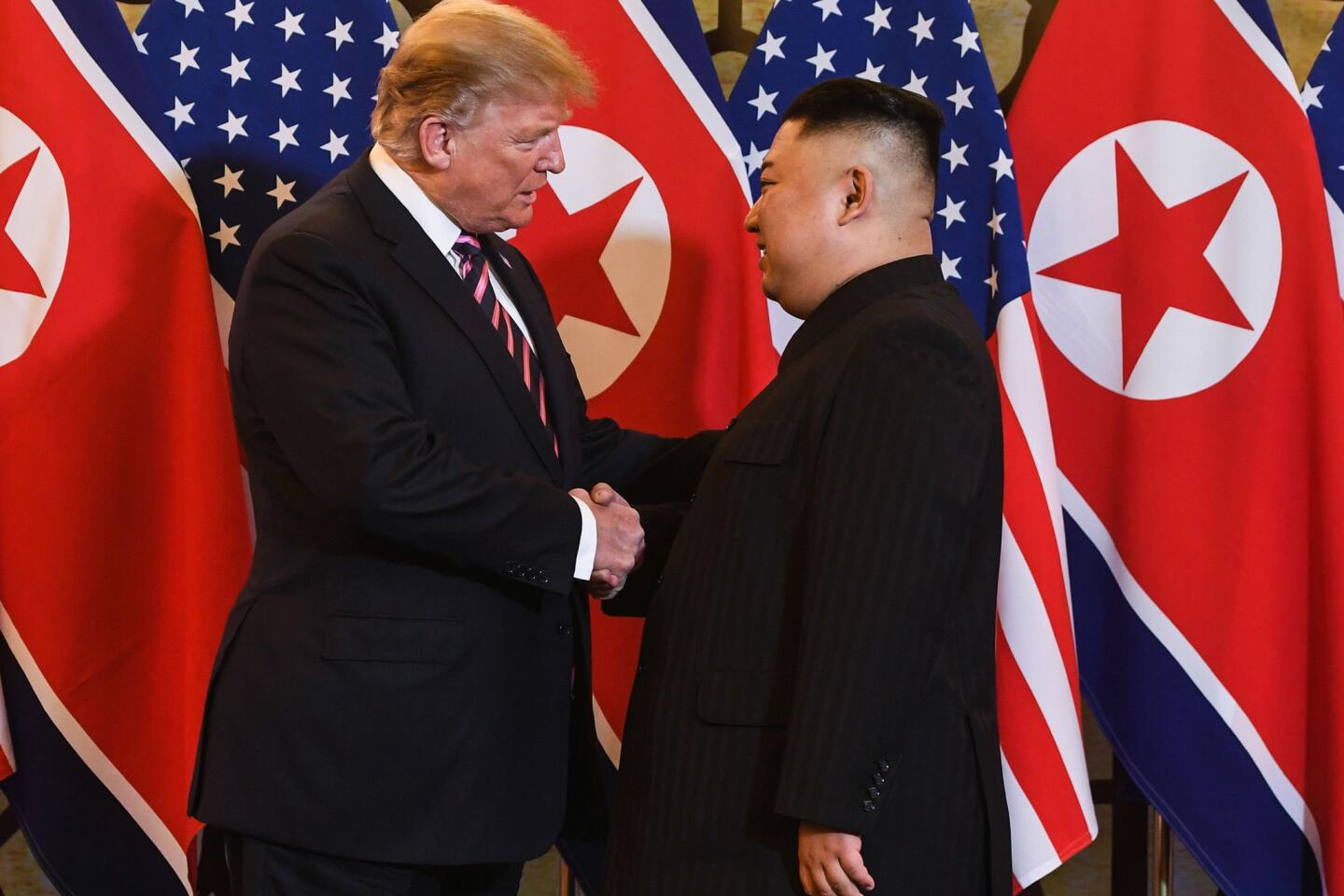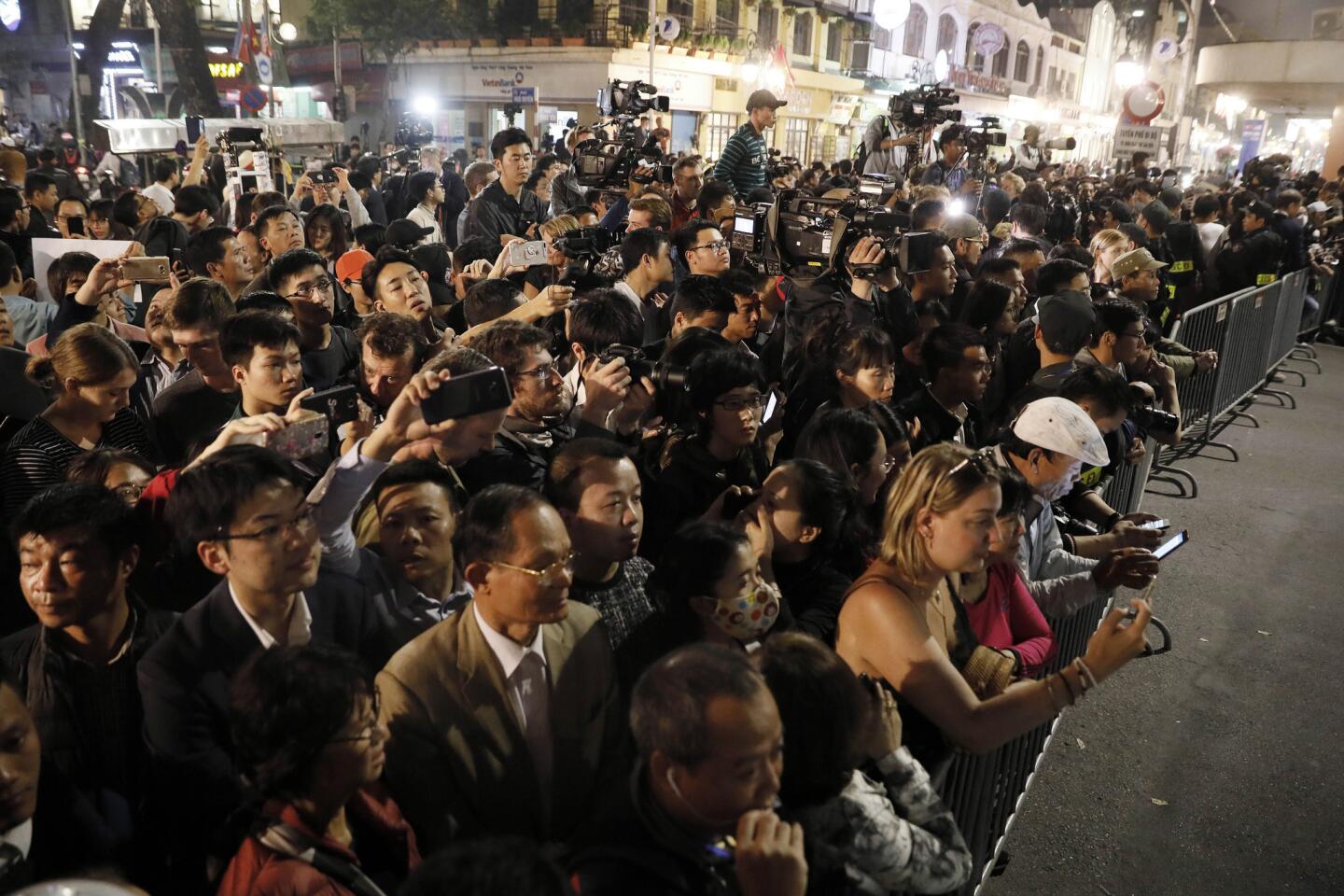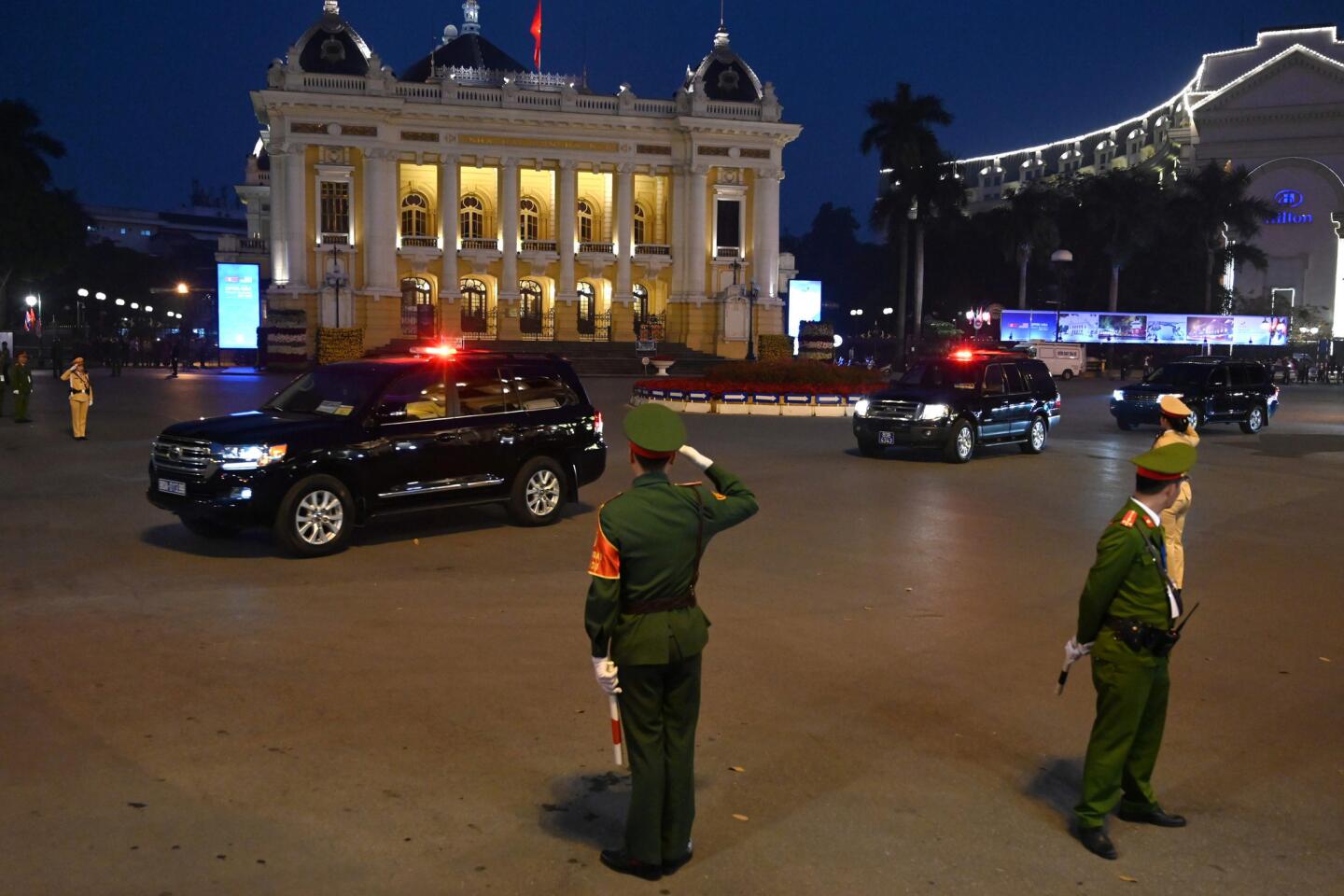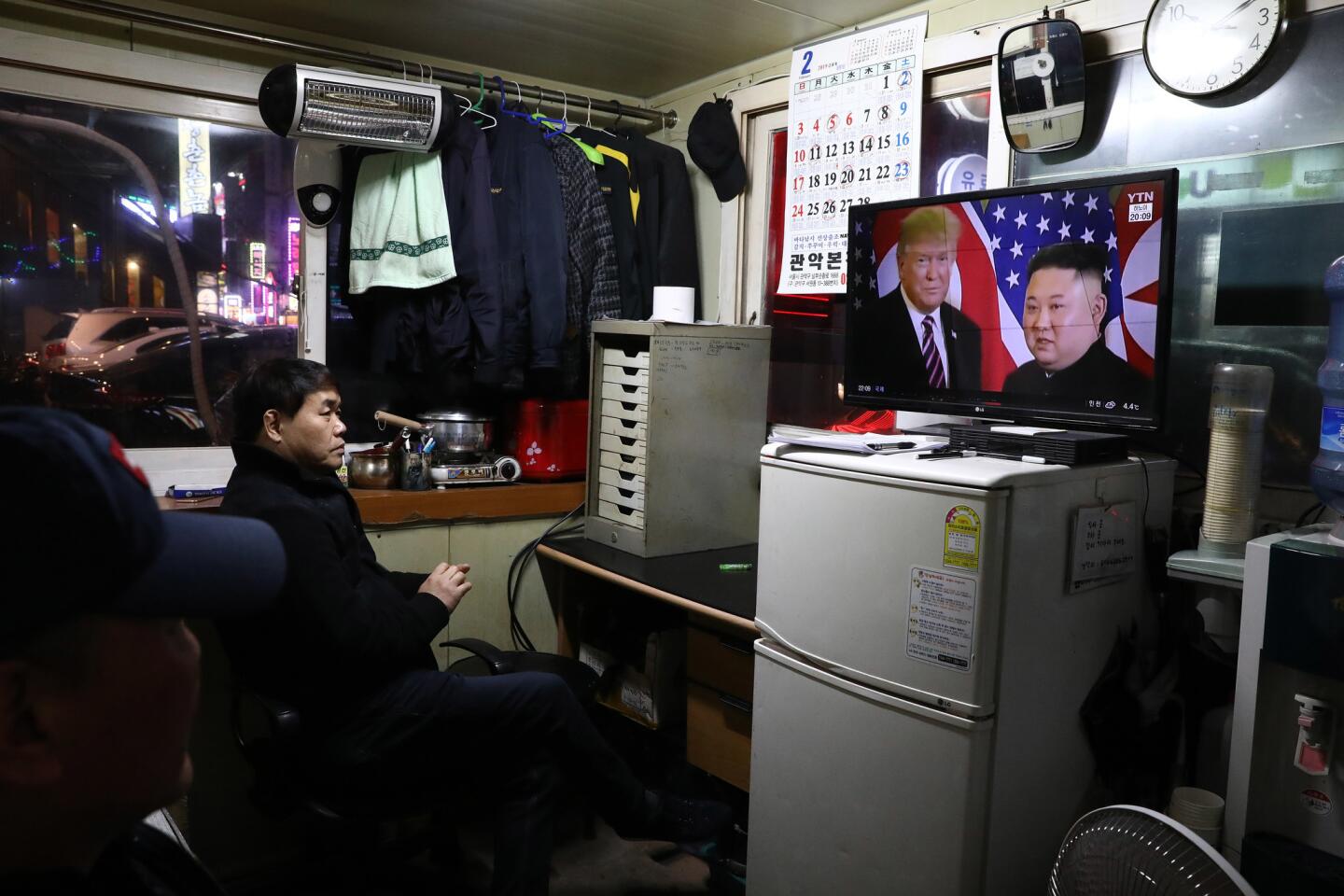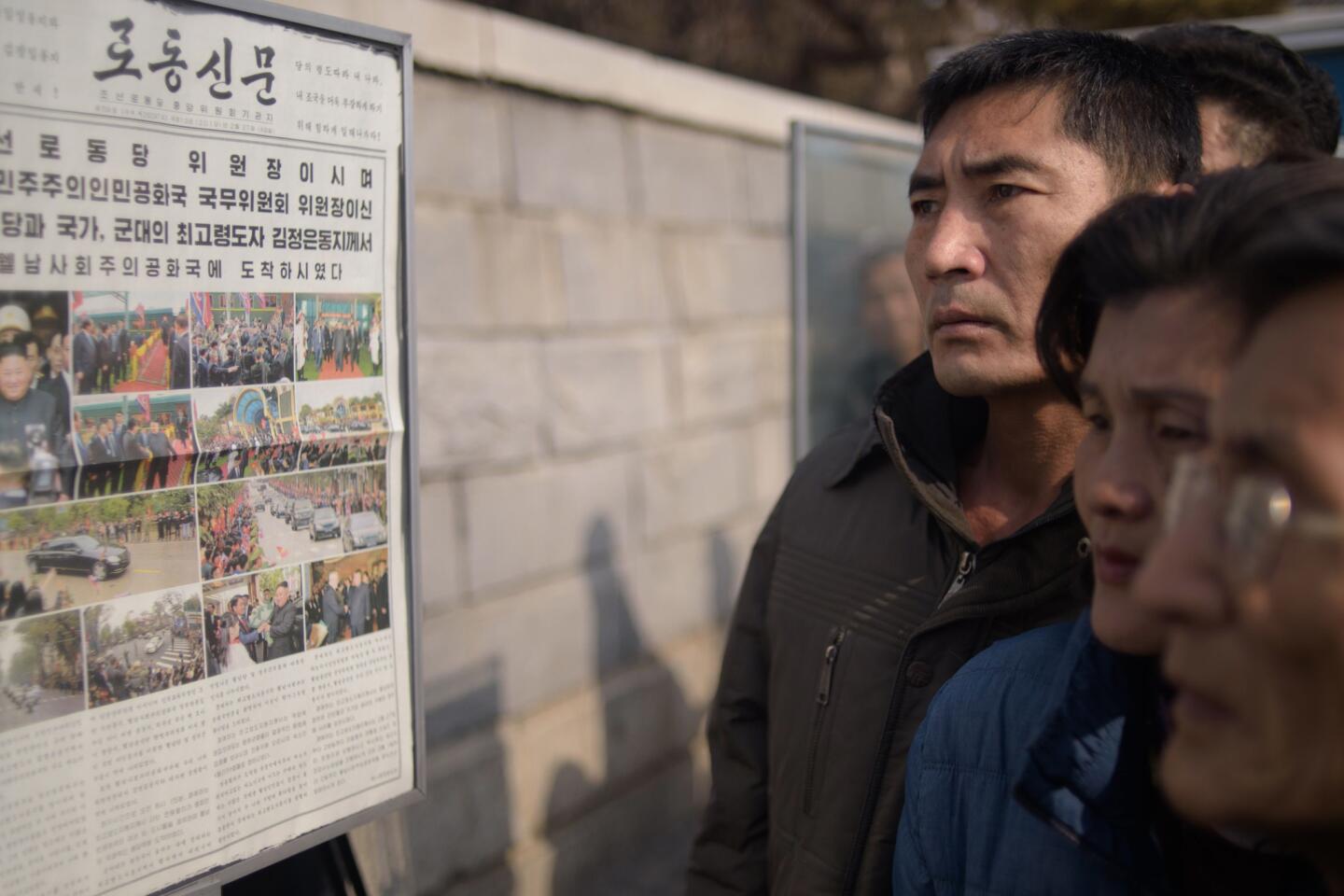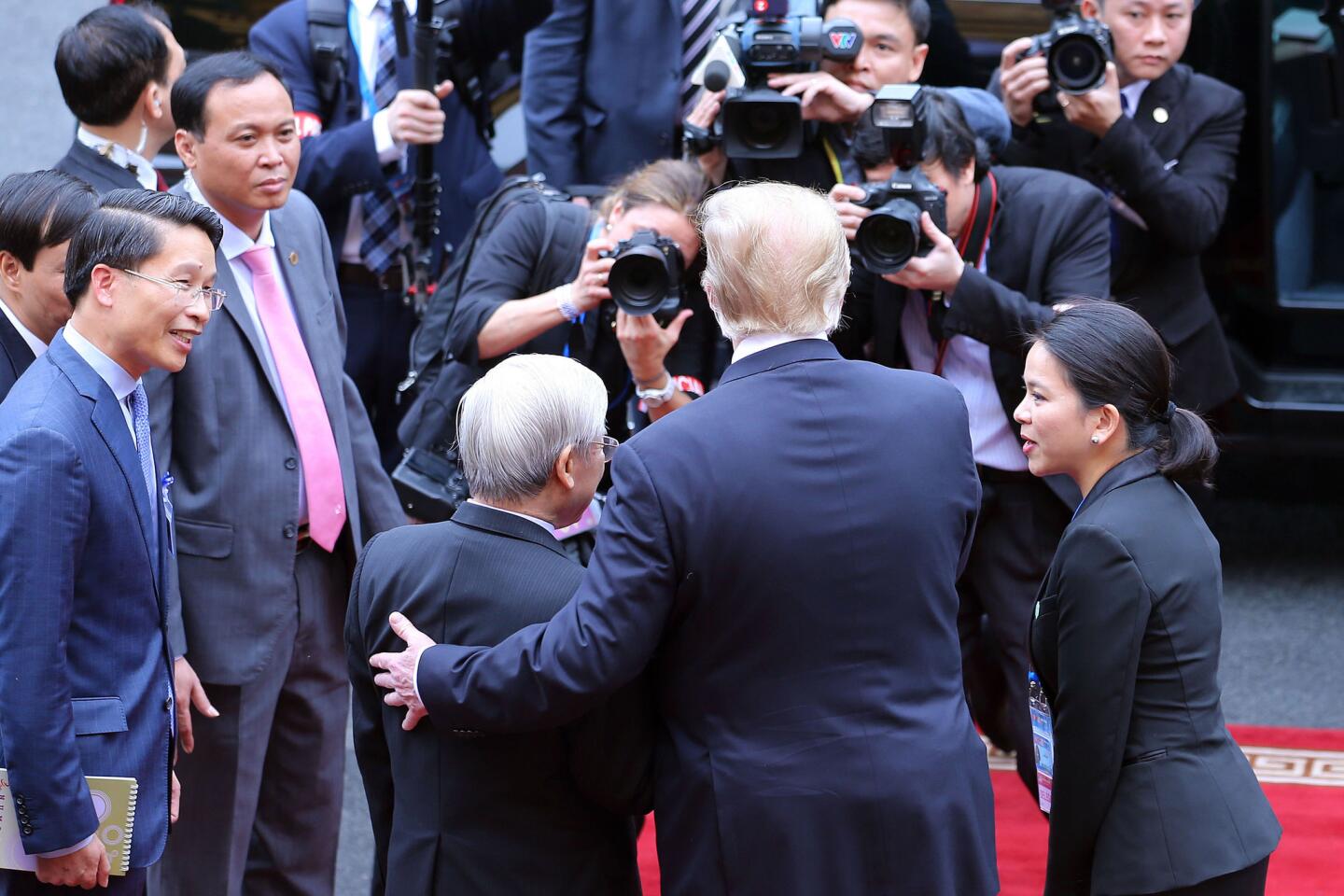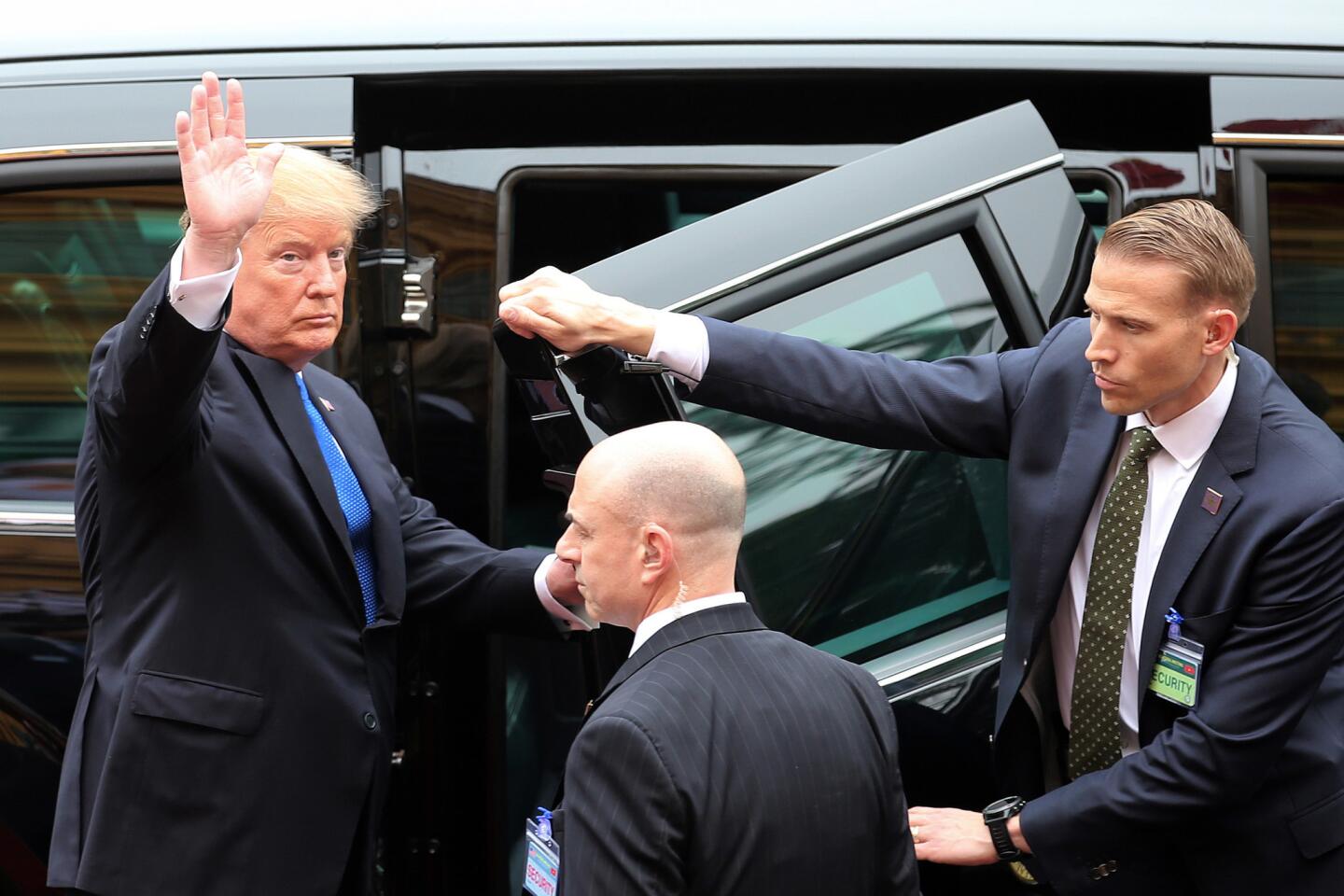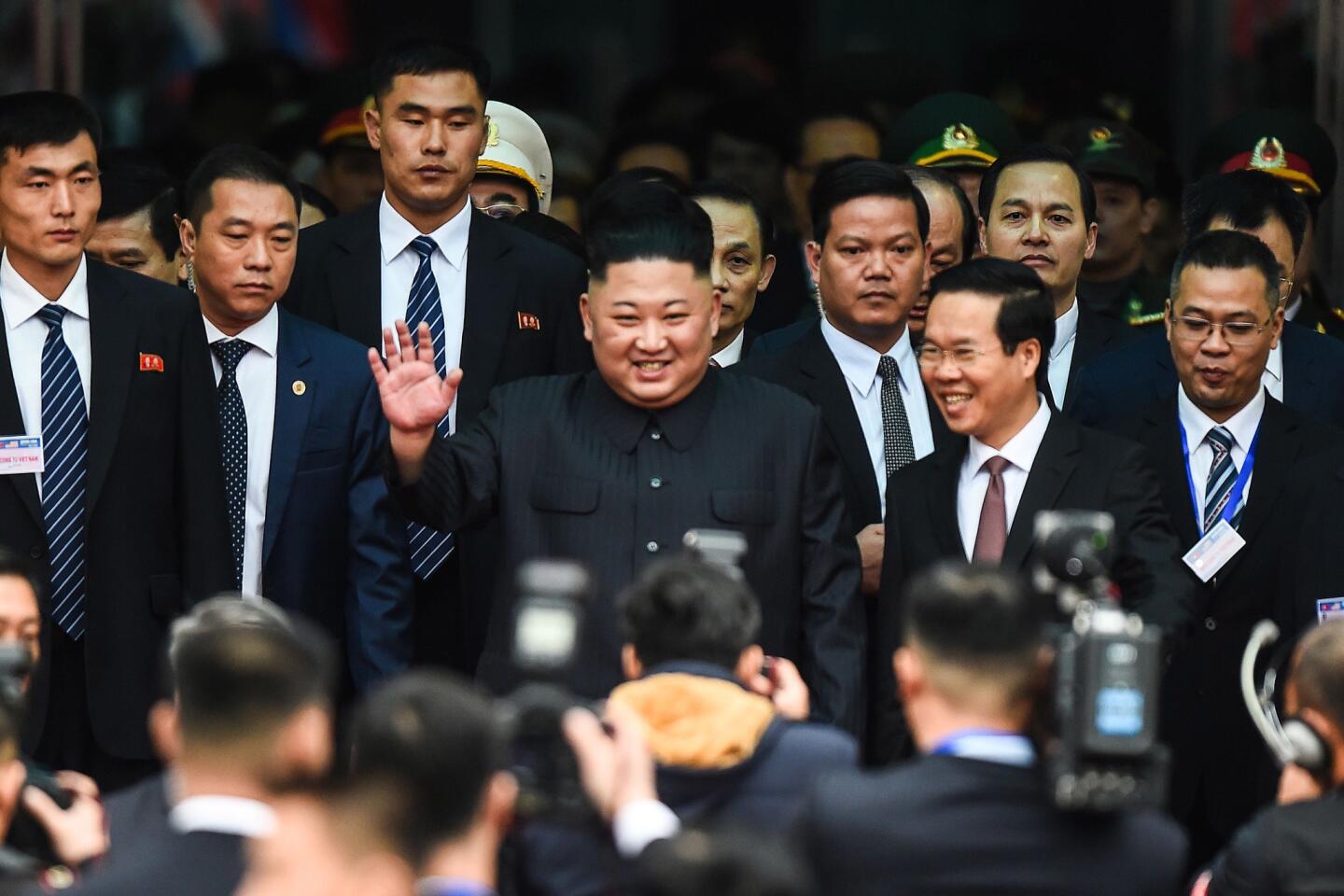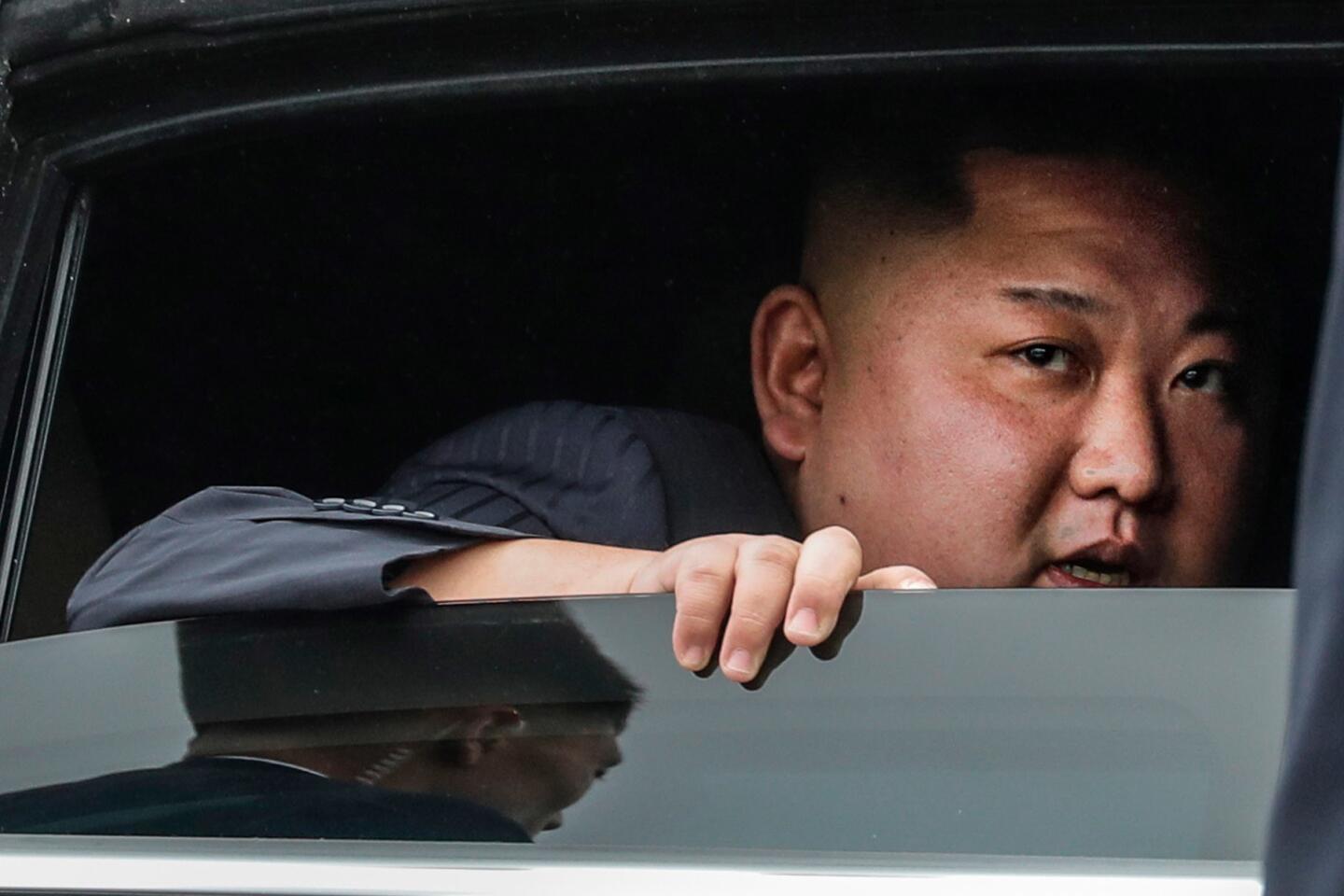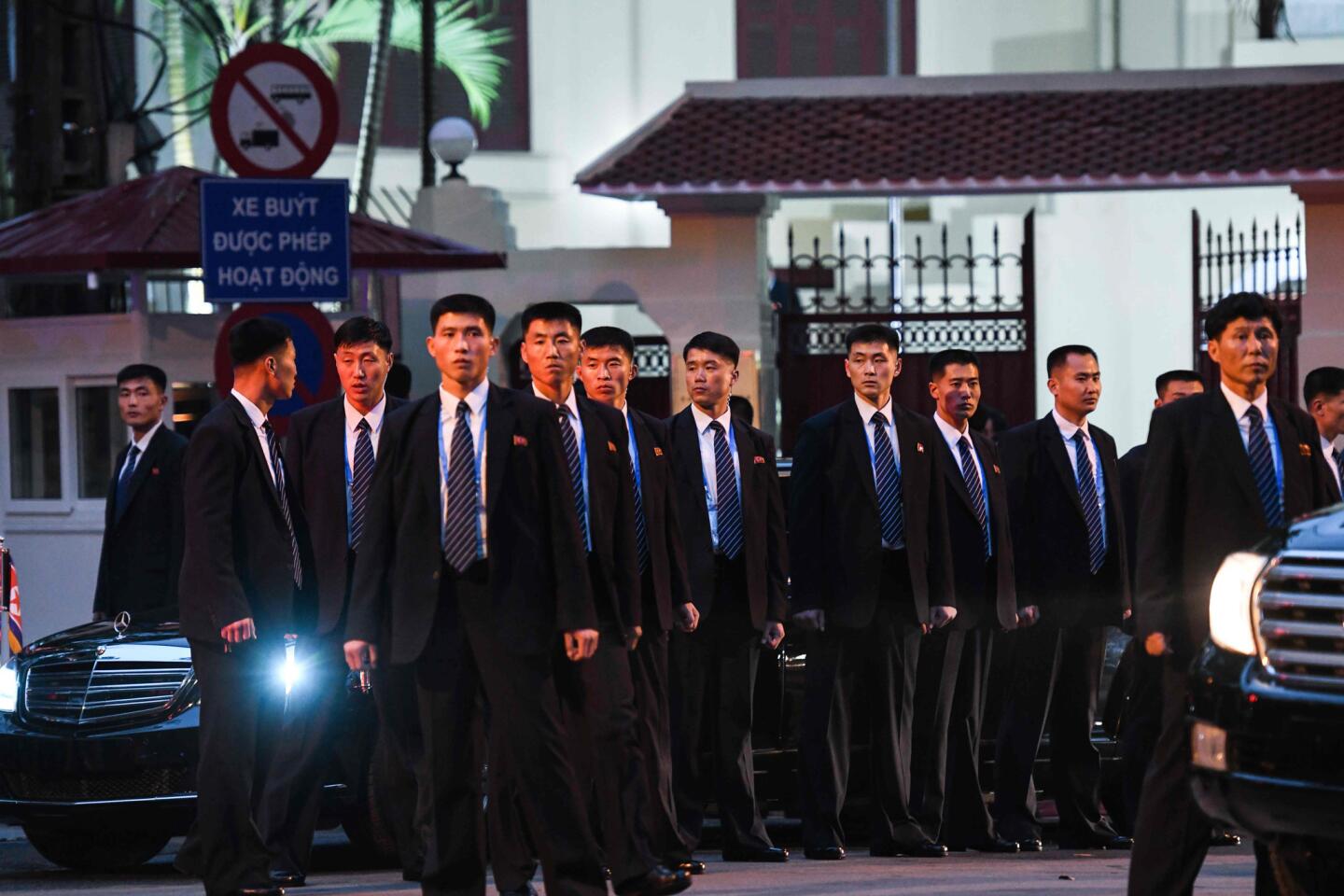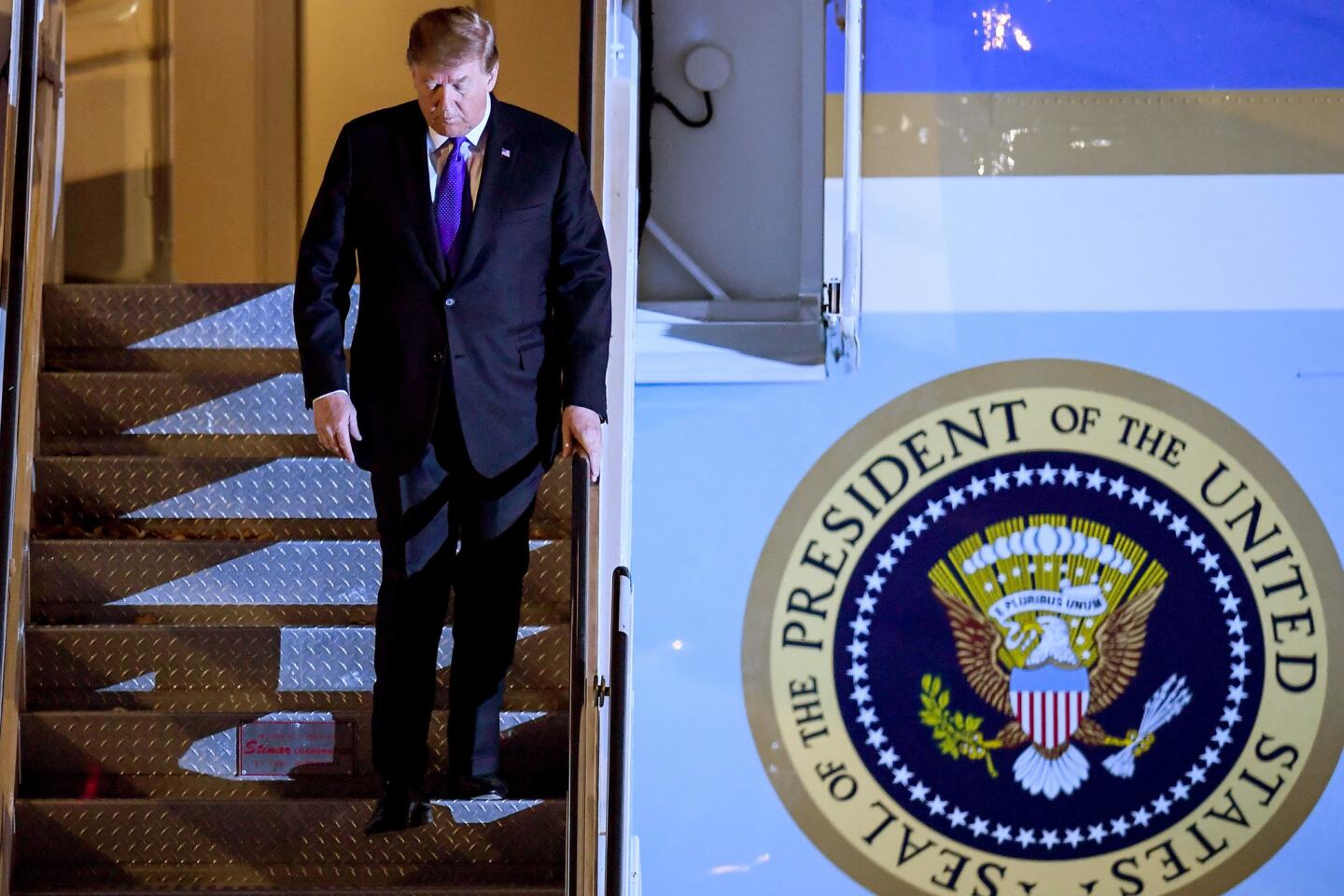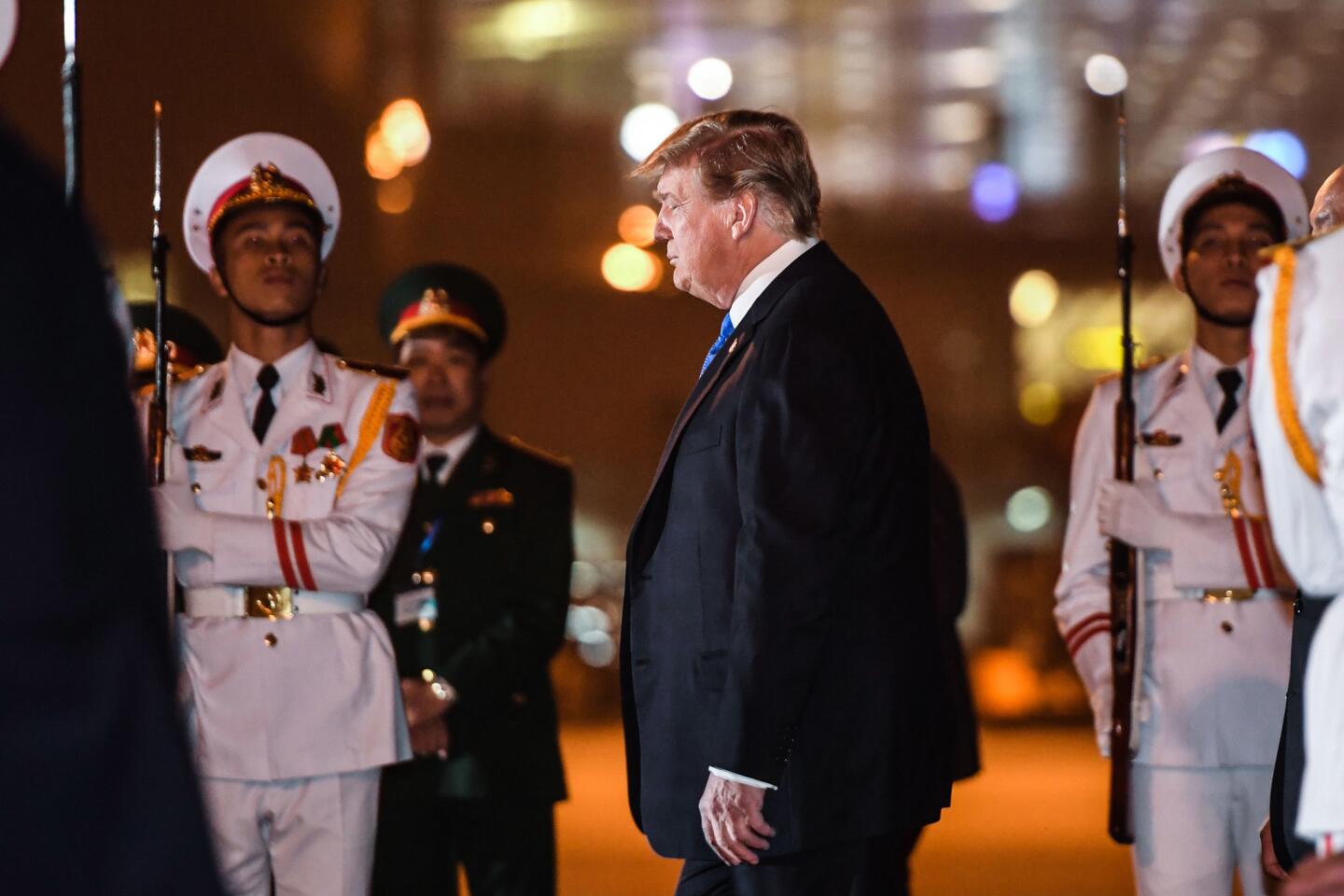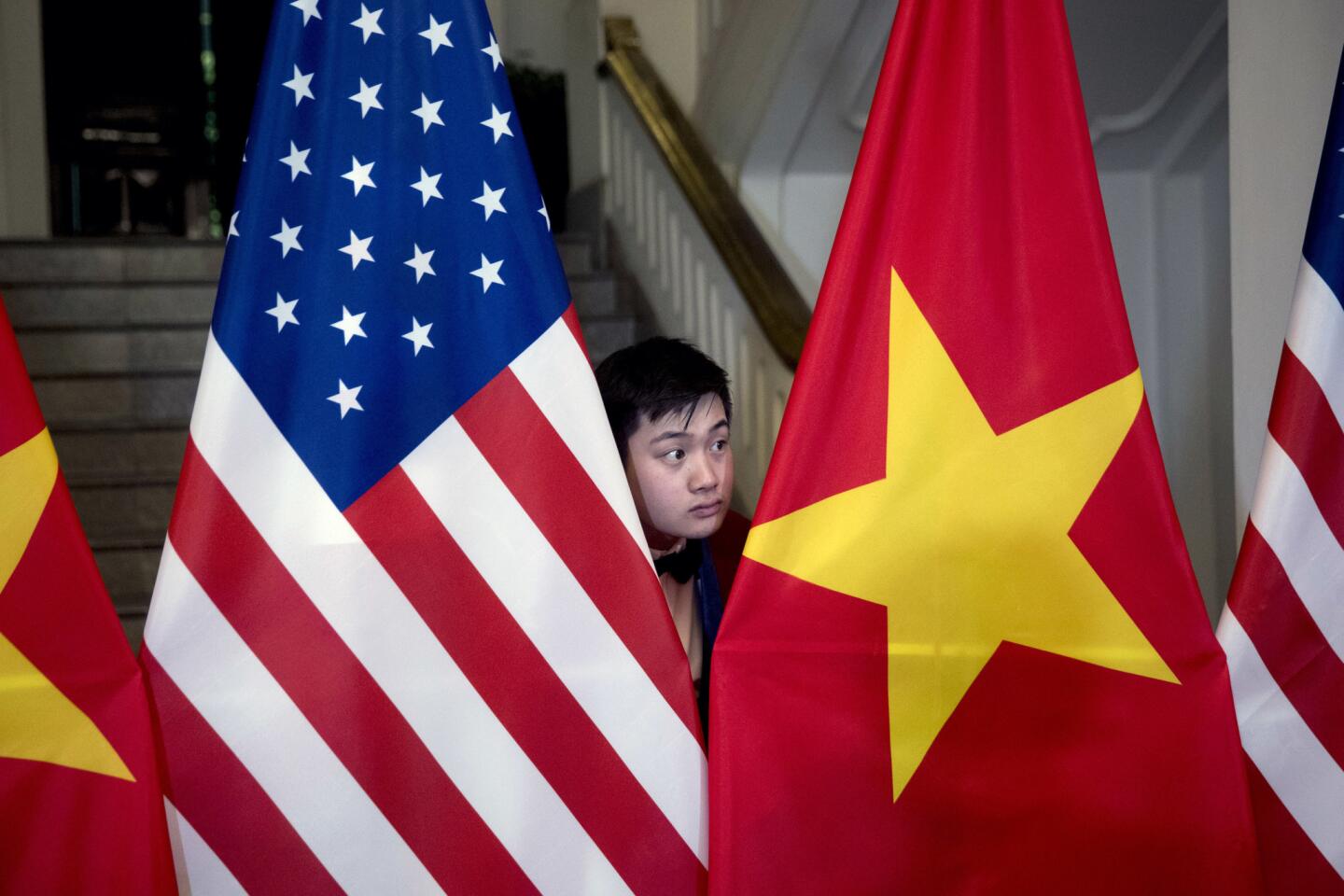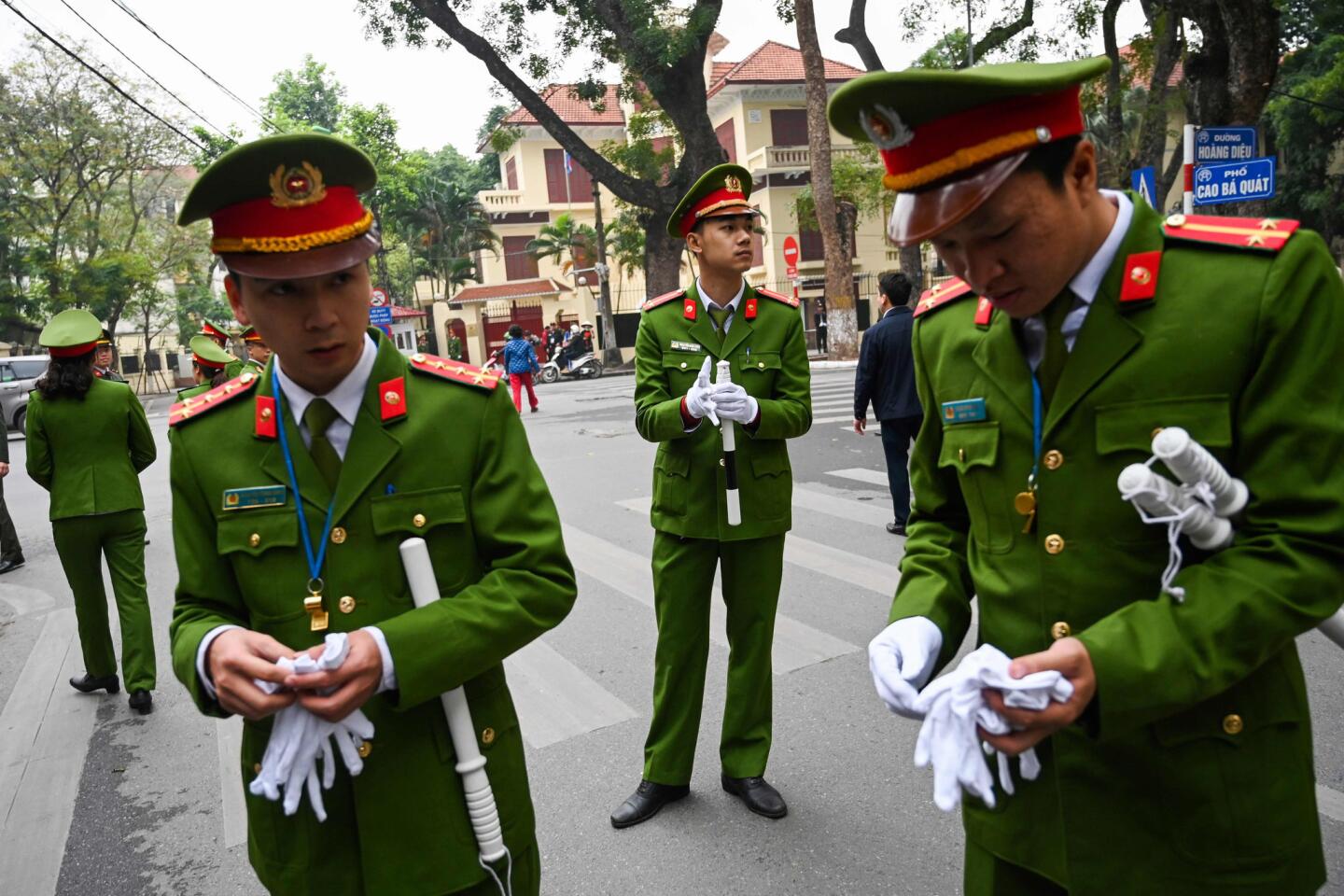President Trump’s summit with Kim Jong Un ends with no agreement; White House says ‘talks to continue’
- Share via
HANOI, Vietnam — President Trump’s second summit with Kim Jong Un was cut short Thursday with no agreement on rolling back North Korea’s nuclear program, a setback to Trump’s high-profile diplomatic outreach to the reclusive nation.
Ending their meetings early without even the symbolic concessions that had been expected, Trump and Kim scrapped a working lunch and canceled a ceremony at which they had been due to sign a joint statement.
Trump’s motorcade departed Hanoi’s Metropole hotel about 1:25 p.m., more than an hour earlier than originally scheduled.
“We had some options, but at this time we decided not to do any of the options. … Sometimes you have to walk,” Trump said at a news conference a short time later.
“No agreement was reached at this time, but their respective teams look forward to meeting in the future,” White House Press Secretary Sarah Huckabee Sanders said. She described the meeting in Hanoi as “very good and constructive.”
The abrupt cancellations were surprising given the conciliatory remarks made by both leaders in brief public comments Thursday morning at the Metropole, where they were holding their second summit in eight months.
Trump said he was in “no rush” to denuclearize North Korea, even as Kim suggested that he might be ready to shed his nuclear program.
“If I’m not willing to [denuclearize, I] wouldn’t be here right now,” the North Korean leader said in response to a reporter’s question. Asked if he was willing to take concrete steps to do so — something he has been unwilling to do in the past — Kim replied, “That’s what we’re talking about now.”
Trump said the two sides were having “very, very productive discussions. The relationship is as good as it’s ever been, I think better.”
Expectations were higher for concrete concessions from North Korea after the leaders’ first summit in Singapore last June produced only vague commitments from Kim to denuclearize, with no details or a timetable.
Kim Jong Un was also thought to be seeking at least partial relief from economic sanctions choking North Korea’s economy.
But the meetings ended without even an agreement on symbolic issues, such as declaring an end to the Korean War or opening a U.S. liaison office in Pyongyang, where the United States does not have an embassy.
At dinner the night before, as the two leaders shared grilled sirloin and chocolate cake at the Metropole, the high-wattage summit stagecraft was upstaged by a dramatic congressional hearing in Washington, where Trump’s former lawyer Michael Cohen denounced the president as “a racist” and a “con man” and said he had skirted or violated banking, tax and campaign finance laws.
The explosive testimony clearly rattled the president in Hanoi. He lashed out at Cohen on Twitter, accusing him of doing “bad things unrelated to Trump” and “lying in order to reduce” a three-year prison sentence for crimes that included arranging payments during the 2016 election to silence women who claimed affairs with Trump.
Aides to the president, already nervous that Trump would offer concessions to Kim, acknowledged that Cohen’s harsh testimony and Trump’s reaction to it are additional wild cards in the high-stakes summitry.
Although Kim is the authoritarian ruler of one of the most repressive nations, Trump called him a “good friend” in a tweet and praised him when they met Wednesday.
The two leaders issued a vague statement in Singapore calling for denuclearization. But they did not produce a timetable or require any specific actions, and working-level negotiations have largely stalled since then. U.S. intelligence officials say North Korea has continued to produce fissile fuel for nuclear weapons over the last eight months.
The second summit began shortly after 6 p.m. Wednesday. Trump and Kim, who have developed a personal chemistry, greeted each other warmly, shaking hands, smiling and posing for photos in front of a display of U.S. and North Korean flags.
In brief remarks, Kim praised Trump’s “courageous decision” to begin a dialogue, and Trump promised to help develop North Korea’s economy if he denuclearizes.
“Your country has tremendous economic potential, unbelievable, unlimited,” Trump said. “I look forward to watching it happen and to helping it to happen, and we will help it to happen.”
In response to a question, Trump signaled that he had not backed away from his demand for full and verifiable denuclearization. He also confirmed reports that a declaration to end the Korean War was under consideration.
When a reporter asked about Cohen’s testimony, the president pursed his lips but did not answer.
Afterward, Sanders informed the small pool of reporters who had been allowed into the room that they would no longer be allowed access to the next event, a “social dinner,” because their questions during the photo op had apparently upset the participants. Kim was not asked a question.
Two of the six reporters in the pool were eventually allowed into the dinner but those who asked the questions were barred. In a statement, Sanders cited “the sensitive nature of the event” but media organizations cried foul.
“Previous administrations have often intervened to protect press access when foreign leaders have tried to limit coverage of presidential meetings abroad,” said Norman Pearlstine, editor of the Los Angeles Times. “The fact that this White House has done the opposite and excluded members of the press provides another sad example of its failure to uphold the American public’s right to see and be informed about President Trump’s activities.”
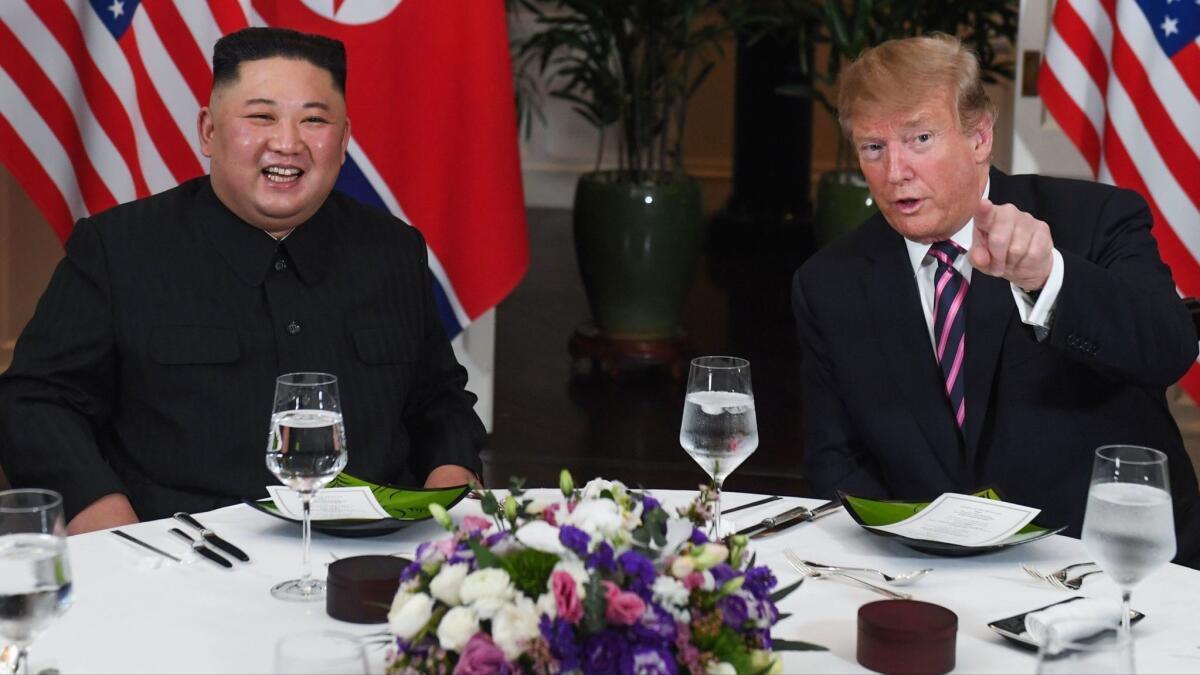
While Trump bristled over reporters’ questions, he relished the attention of photographers snapping away before him. He singled out a New York Times photographer, asking him to send his photos to the White House so he could share them with Kim.
The dictator, who does not allow a free press in his country, appeared to laugh.
It was the second time the White House limited access for reporters covering the nuclear summit.
A day earlier, the White House abruptly relocated a media work space it had established in a hotel ballroom to accommodate hundreds of journalists, apparently after the North Korean delegation, which was staying at the same hotel, raised objections.
Trump and Kim were joined at the dinner by Secretary of State Michael R. Pompeo; Trump’s acting Chief of Staff Mick Mulvaney; Kim Yong Chol, a top aide to Kim; North Korea’s foreign minister, Ri Yong Ho; and their interpreters.
The White House said that Trump would hold a news conference Thursday after his meetings end with Kim, and that he would then leave for Washington.
Prior to the summit, U.S. negotiators had sought detailed commitments from Pyongyang to dismantle at least part of its nuclear weapons facilities, while Kim wanted relief from punishing economic sanctions and a declaration to formally end the 1950-53 Korean War.
Earlier Wednesday, Trump held multiple meetings with Vietnamese government officials, enjoying a red-carpet welcome at Hanoi’s historic presidential palace and office of government.
He also announced Vietnamese investment in U.S. aerospace, pointing to the host country’s “thriving” economy as an example of the growth possible for North Korea should it take steps to denuclearize.
In addition to tweeting about Cohen, Trump took a shot at Sen. Richard Blumenthal (D-Conn.), who has acknowledged misrepresenting his military service during the Vietnam War. Blumenthal had claimed he fought in Vietnam, when he actually served in the Marine Corps reserves and was not deployed overseas.
Trump resurfaced a favorite nickname, tweeting that he had “now spent more time in Vietnam than Da Nang Dick Blumenthal,” adding, “His war stories of his heroism in Vietnam were a total fraud — he was never even there. We talked about it today with Vietnamese leaders!”
A White House readout of Trump’s meetings with the Vietnamese did not mention them discussing Blumenthal.
Trump never served in uniform and avoided Vietnam by receiving five draft deferments, including one for bone spurs in his heels.
Cohen told the House Oversight Committee that Trump once acknowledged to him that the bone spurs were just an excuse, telling him he avoided Vietnam because he wasn’t “stupid.”
When the hearings began in Washington, administration officials were ending the long day in Hanoi in the hotel bar. Cohen’s testimony played silently on a big screen just feet from their table.
More to Read
Sign up for Essential California
The most important California stories and recommendations in your inbox every morning.
You may occasionally receive promotional content from the Los Angeles Times.
